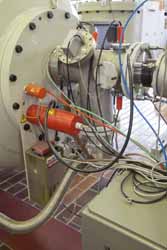Building up experimental nuclear physics
The EU-funded 'Clustering phenomena in nuclear physics: Strengthening of the Zagreb-Catania-Birmingham partnership' (CLUNA) project has strengthened research capacity and collaborations between these four groups in nuclear physics. CLUNA funds were used to upgrade research infrastructure for low energy measurements at RBI with the purchase of a new silicon detector array for charged particle detection. Additionally, project partners designed and built a novel low-noise, high-power electricity system and gas target system to use helium and hydrogen gas. A data acquisition system was completed and commissioned to enable the simultaneous detection of neutrons and charged particles. In short, a fully operable RBI detection system was realised boasting a large silicon detector array, neutron detector array, associate front-end electronics and data acquisition system. This one-of-a-kind portable and compact RBI experimental end-station in the western Balkan region should facilitate research in nuclear structure and reaction studies as well as nuclear astrophysics. Cutting-edge research in nuclear physics at the RBI Tandem accelerator facility requires the routine production of ion beams such as 3He, 4He, 9Be, 10,11B and 18O. For this purpose, new procedures were set up and materials (e.g. water and gas isotopically enriched in 18O) required for their production were purchased. Besides technological improvements, considerable attention was dedicated and funds were disbursed to improve research capacity by training personnel. As a result, three outstanding students were employed at accelerator facilities and are receiving local funds for their PhD. Training activities included several workshops, a summer school, international conferences, and exchange visits between partnering and other top institutions to gain theoretical and practical knowledge in nuclear physics. CLUNA successfully strengthened research collaboration and scientific expertise between the RBI, UoZ, INFN-LNS and the UoB by providing complementary facilities and disseminating knowledge in nuclear cluster studies. Furthermore, upgrades in infrastructure and capacity facilitated new collaborations at national and European levels with the approval of two new proposals. Project outcomes will encourage more interest in nuclear physics and attract more talent to the participating institutions. Several industrial sectors will benefit from improved analytical services such as radiocarbon dating for materials analysis, development of advanced materials and homeland security.



